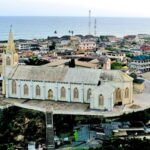
By Justin Kojok
I’m going to examine the effects of Charismaticism, good and bad, spiritual and physical developments of its followers in Ghana.
Who are the pioneers of charismatic ministry in Ghana? Who blazed the trail and who were there at the time it all began, at the time it wasn’t fashionable to be charismatic? Those of you who missed the part one of this article may want to read it by clicking the link here before continuing with part two. Click here.

It is difficult to pinpoint a particular time and person who pioneered charismaticism in Ghana. Nonetheless, as I stated in my first submission, a few people stand to be counted in this phenomenal trend. It is not insignificant to say however that those who have followed the development of the movement and the trend in Ghana unanimously would agree that Brother Emmanuel Enoch Amino Agbozo is the main pathfinder. He was the focal point of the rapid spread of Charismaticism in the late 1970s and early 1980s. It is therefore not out of place to call him the grandfather of charismaticism in
Ghana. It worth mentioning that there were a lot of others guys who did tremendously incredible in propagating the gospel in Ghana before and during the period in question. Let me draw your attention here that the focus of this article is on charismaticism in Ghana and who spearheaded it. If I’m going to talk about Christianity in general, who did what and the effects on the people and the socio-economic ramifications, then I will be writing a couple of books and not articles.

To focus on this article, after pulling and peeling off the clouds, it is unarguably clear without doubt that the credit for moving charismatic trend from the periphery to the center of Christianity in Ghana must ultimately go to Archbishop Nicholas Duncan Williams. Having embraced Christianity in an eerie wind fashion, he decided to break the back of genteel religion and open it up to popular culture. Duncan
Williams, no doubt, may have his downfalls in some aspect as a human being, it is essential to reward his immaculate efforts invested into making Christianity and for that matter charismatic worship attractive and acceptable to young professionals. Though he faced a lot of opposition and criticism when he championed ‘living heaven on earth’ lifestyle and his controversial fashion designer wear etc. Charismaticism has affected the church tremendously not in terms of composition but in terms of the forms of worship. People who would never go to the traditional churches get attracted to the free style of worship and in the end get converted and became very strong Christians while others became pastors. Most youth now are attracted to church rather than the cinema and dance halls. This is not surprise. In 2004 government of Ghana records indicated that there were at least three thousand registered churches in Ghana and this number has tripled since.
What is the trend? In the early years of Pentecostalism in Ghana, especially the 1980s and 90s, people were into single ministries and each had his own followers in specialized area. Hence, you would see individual ministries in the area of prayer, such as the numerous prayer camps dotted all over the country. There were also those in the healing ministries who opened church houses solely devoted to healing the sick and carrying out deliverance services and intercessory worship. These ministries are part of the five-fold ministries mentioned in Ephesians 4: 11.
Because of its nature and the liberal interpretation of the scriptures, charismaticism has the tendency to proliferate easily. In some way, this is a negative trait. It preaches freedom of worship, and therefore breakaways are common since the least divergence in doctrine or mode of worship easily leads to separation.
Now the new prophetic movement has become a sub current of the charismatic ministry with emphasis on prophesy. It is usually a department of a charismatic church, responsible for prophetic matters and the word of knowledge. This sub movement has led to another movement in the charismatic movement. This movement was born out of the excessive emphasis of prophesy by the prophets working in that department of the church thereby undermining the rest of worship. Any attempt to caution them on this trend would always culminate in breakaways. Such prophets who claim they have been called into the ministry, with no formal biblical training have caused immeasurable dimension of pandemonium in the church body today
Indiscipline is one of the reasons for the spread of the many charismatic churches in Ghana and abroad. Subordinate pastors have been eaten by pride and do not want to conform or serve under others since they believe they have their own charismata to develop by opening their own churches. Another trend in the charismatic set up is the one-man church ‘business’, with the leaders being the sole signatories of church accounts, often accountable to no one. They don’t pay taxes, no auditing, and no accountability to their own church members. Some years ago in early 2000s, there was an issue where church money was smuggling outside Ghana. The person was almost caught by security at the Kotoka International Airport (KIA), and avoid being caught, he went into the restroom and flushed the dollars in the toilet. This trend attracted a greater proportion of greedy young men into ministry just to make money. They use the money as if it is their own to the detriment of the sheep. Yet the role of men of God is to be the shepherd, and a good shepherd takes care of the sheep.
Few years back, one of the prosperity preachers said that he was traveling to Ghana and at London Heathrow airport, a guy came to him and told him he applied the teachings of his book and got rich. This newly rich guy gave preacher thousands of pound sterling which, according to the prosperity minister, he filled all his pants and coat pockets.
One more trend that has eaten deep into the charismaticism is the prosperity doctrine. The prosperity ministers and their messages made it seem that once one becomes a Christian, God prospers them automatically, as though Christianity is chiefly a means to worldly riches. This deceit made youth very lazy to work. The unemployed are deceived by their preaching to the extent that instead of looking for jobs and doing courses to add value to themselves, they go and sit in the church rooms on week days praying and hoping that manna would fall from heaven. I believe in prosperity just as the Bible states but this trend is a humanistic definition of prosperity. Some of these prosperity preachers go to any extent to use the prosperity messages to exploit their desperate congregations. It is all a big exploitation of man by man, of the stupid by the cunning, and of the weak by the strong. Being One-man leadership without accountability or supervision, the result is a greater tendency towards arbitrariness, wanton sexual exploitation, and constant confusion.
Nonetheless, one can say with degree of certainty that God has used the new wave of churches to revive the old denominations. With so many churches, there is the tendency for all the churches to be on their toes, as no one church enjoys monopoly. There is now urgent need to catch the eye of potential converts and consolidate them than ever. This is certainly a blessing in disguise.
What are the ultimate effects of charismaticism in Ghana? More people became and continue to become born again and faithful followers of Jesus Christ. Secondarily, they understand vibrantly the scriptural aspect of life and live according to their purpose of life here on earth, and strive for the crown in Heaven. Again, many Christians gained knowledge of how to relatively manage their finance, health, jobs and social aspect of Christianity in terms of giving to help the disadvantaged and the elderly in the society. Some churches covert criminals and prostitutes, train them and help them established their own businesses.
Some of these charismatic churches did not only concentrate on spiritual aspect of life but also contribute to the development of health and education sector of the economy. This is seen in the number of hospitals, primary, secondary and tertiary institutions they have built. Those of you who are familiar with Ghanaian tertiary institutions would realize that one of the first private universities were established by a charismatic church. Current statistics indicate that universities established by churches tripled the state owned universities in Ghana. No doubt, charismaticism has done a lot in the promotion and propagation of the Gospel and continues to do more, both spiritually and socially.












More Stories
Long-distance Relationships And Tips For Success.
The Birth and Effects of Charismaticism in Ghana (I)
“My biggest achievement so far is being a United Nations goodwill ambassador”- Rocky Dawuni